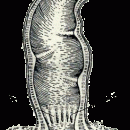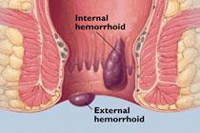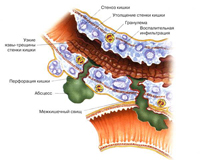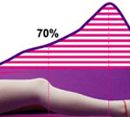In the incomprehensible state in the stomach, then bloating, then diarrhea, then constipation, then pain and discomfort - now there is a name: irritable intestinal syndrome (SRK). This is a functional disease: no ulcer nor visible inflammation is defined during the examination. It would seem that there is no reason for bad well-being. And the symptoms - there.
Content
 Someone will say: no ulcer - you need to rejoice, think, discomfort in the stomach! Tell this a girl who can not meet with young people, because her suffers a constant bloating. Or a young man who knows all public toilets on the way to work. Or to someone who wakes up in the morning and feels pain in the stomach, which dies only after a trip to the toilet....
Someone will say: no ulcer - you need to rejoice, think, discomfort in the stomach! Tell this a girl who can not meet with young people, because her suffers a constant bloating. Or a young man who knows all public toilets on the way to work. Or to someone who wakes up in the morning and feels pain in the stomach, which dies only after a trip to the toilet....
SRK: Is it really everywhere? Doctors belong to the SRC with all seriousness. Not surprisingly, since the symptoms inherent in the SRC are found in 10-20% of the adult population, and the most able-bodied - more than 80 patients - aged 30 to 60 years. Women sick 2 times more often. Since 1988, there are already three international conferences dedicated to the diagnosis and treatment of SRC.
Do not deliver: Despite all the efforts, the cause of the irritable intestine syndrome by scientists is still unknown. It is believed that in the SRC there is an increased sensitivity of the intestinal sensory apparatus, which leads to a spastic reaction in response to a normal stimulus to reduce. The second mechanism is to reduce the threshold of perception of pain.
The predisposed to the SRCs turn out to be, on the one hand, those who are experiencing constant stress, psychological injuries. On the other hand, provoked the beginning of the disease can food poisoning and intestinal infections.
Syndrome one hundred symptoms. And yet it is worth staying on the symptoms of the SRK. The mains are recurring pain or discomfort in the stomach, the beginning of which is associated with the change in the frequency or shape of the chair, and the improvement occurs after defecation.
Additional symptoms include a stool frequency violation: constipation (chair less than 3 times a week) or diarrhea (the chair is more often 3 times a day), the pathological shape of the chair: a lumpy, solid, liquid (watery), as well as a sense of incomplete emptying , secretion of mucus, bloating bloating.
To make it possible to show about the irritable intestinal syndrome, it is necessary that the above symptoms have been observed at least for six months.
In addition, there are so-called «Symptoms alarm» (fever, blood in feces, weight loss, anemia) who are diagnosed with unlikely. And last: SRK - day guest, night symptoms are not typical for him.
Since the disease has no specific signs, for the diagnosis, a clear description of the symptoms and the type of pain will be needed. «It is recommended to make a diagnosis on the first day of the patient's appeal», - Specified in the criteria developed by the International Commission in Rome.
In practice, this led to the diagnosis «Irritable intestinal syndrome» Extremely spread. Soon the Central Institute of Gastroenterology conducted a study, and it turned out that the diagnosis of SRC was confirmed only in 24 patients, and 76 patients had other intestinal diseases or diseases with intestinal symptoms. This led to the emergence of diagnostic standards in our country necessary to exclude another pathology. Only with its absence is diagnosed with SRK.
… and three treatment principles
•  About principle first. «This is again», - With longing, my friend says, who has already called him a patient, who's ill. And I understand him. Among the doctors «Syndrome irritated gut» sometimes a joke called «Syndrome irritated head», Because in addition to the main symptoms, there are often those associated with a violation of the work of the central and vegetative nervous system. Comes in the throat when swallowing, pain in muscles, headaches, rapid heartbeat, feeling of incomplete breath, increased anxiety of patients. Here, one gastroenterology is not to do: you have to streamline a lifestyle, to analyze and establish a normal relationship of the house and at work, and sometimes - apply antidepressants.
About principle first. «This is again», - With longing, my friend says, who has already called him a patient, who's ill. And I understand him. Among the doctors «Syndrome irritated gut» sometimes a joke called «Syndrome irritated head», Because in addition to the main symptoms, there are often those associated with a violation of the work of the central and vegetative nervous system. Comes in the throat when swallowing, pain in muscles, headaches, rapid heartbeat, feeling of incomplete breath, increased anxiety of patients. Here, one gastroenterology is not to do: you have to streamline a lifestyle, to analyze and establish a normal relationship of the house and at work, and sometimes - apply antidepressants.
• Principle of the second. It is necessary to observe the power mode, it is desirable to include in your diet food fibers. It happens that certain products provoke the strengthening of symptoms, and then the doctor asks the patient to lead «Food diary».
• Third principle and last. In the treatment of irritable sinth syndrome, drugs are used, of which antispasmodics (Duspatalin, Dicetell) and regulators of intestinal motility (Motilium, Debidat, Loperamide) are maintained.









